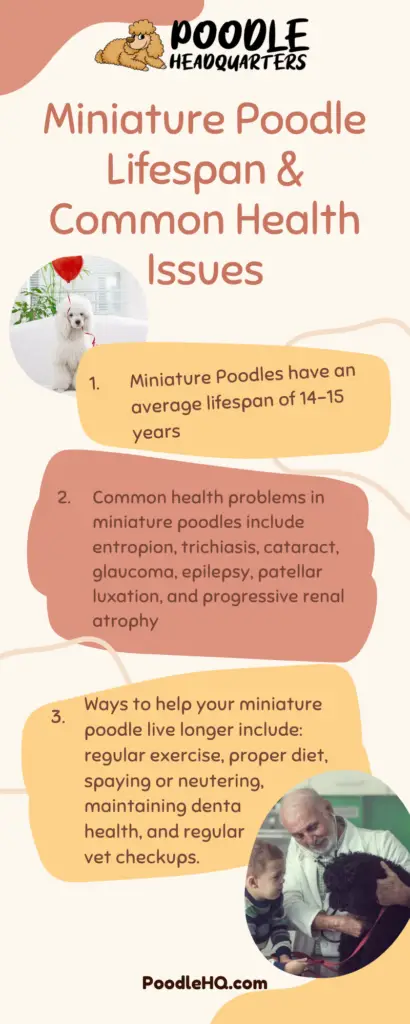Dogs are often a human’s best friend. They’re full of unconditional love, loyalty, and infectious energy!

This is especially the case with Miniature Poodles.
If you’re not familiar with the Miniature Poodle, it’s a stunning type of Poodle and one of the smallest that exists.

Read our Smart Poodles - Smart Tricks eBook for only $2.99
Dive into a treasure trove of engaging tricks and tips designed specifically for your poodle!
On average, they can grow between 11-15 inches / 28-39cm tall and weigh between 15-17lbs / 6kg-8kg.
By their size alone, they’re cute little furballs that are great pets for any home. However, if you choose to own one, you should have the time to raise it right and help live the longest life possible.
To help you do so, today we’re going to cover all things about the Miniature Poodle’s lifespan.
What Will You Learn? 👇
What is the average Miniature Poodle lifespan?
Generally, the average life span of a Miniature Poodle can range between 14-15 years. In comparison to other breeds, this is quite a long length! This life expectancy has mainly come from a study conducted by British researchers that looked at 23 Miniature Poodles.
The average taken from this study found that the Miniature Poodle tends to live for 14 years and the longest was 18.5 years. Compared to the other two Poodle breeds, they tend to live a bit longer than the Standard Poodle (12 year average life expectancy) and a bit less than the Toy Poodle (14 years average life expectancy).
Common health problems in miniature poodles’ life

Sometimes, when owning a Miniature Poodle, certain things might be out of your control regarding their life expectancy. One of which is health problems. Miniature Poodles are known to face a few health problems. As a potential owner or one owner, you can help their life expectancy and know about such health problems.
Being knowledgeable will help you look for symptoms and take them to the vet before their health deteriorates. After all, prevention is better than cure! To give you that knowledgeable advantage, the common problems are:
- Entropion: This is an abnormal feature of a Minature Poodles eyelids, where their eyelids can roll inwards. Because they roll inwards, the hair from their eyelids can rub against their eye, causing a lot of pain, ulcers, perforations to the eye, pigments forming in their eyes, and problems with their vision. This is usually treated by corrective surgery.
- Trichiasis: Trichiasis is a condition where a dog’s hair can grow abnormally into other parts of their eye, causing an eye infection and blindness. Normally surgery is required to remove the skin covered in lots of hair.
- Cataract: Miniature Poodles are often predisposed to cataracts. This condition is when the lenses in their eyes become blurred, causing difficulty with their vision. When they’re small, they’re not much of a problem; however, when they become thicker and denser, they can cause blindness. Normally cataracts in Miniature Poodles are treated with surgery.
- Glaucoma: This is often an inherited condition Minature Poodles can get where excess pressure is placed on their eye. As a result, they can stop their eye from being drained of fluid, damaging their optic nerve. If it’s not treated by surgery, it can lead to blindness.
- Epilepsy: A neurological condition that can cause repeated seizures in a Miniature. Treatment usually involves lifetime medication for them to take.
- Patellar Luxation: This is where a Minature’s knee is either dislocated or out of place, causing problems with their mobility and can cause paralysis. Signs of patellar luxation are limping or hopping. Treatment usually involves surgery.
- Progressive Renal Atrophy: A group of degenerative diseases that can affect the photoreceptor cells in a Poodle’s eyes, causing sight problems.
- Addison’s Disease: A hormonal disorder when not enough cortisol is produced by a Poodle’s adrenal gland causing lethargy, diarrhea, increased thirst, shaking, unexplained weight loss, and more.
These are just a few health problems mentioned above; they’re not always guaranteed to occur in a Miniature Poodle. However, knowing about them can save you time and help extend their lifeline.
Ways to Help Your Miniature Poodle Live Longer
As a dog owner, there are several ways you can better the Miniature Poodle’s lifespan, which are:
Exercise
The Minature Poodle is a breed that can get obese quite easily if not exercised well. Plus they have high amounts of energy which needs to be used up daily. You should do this by taking them for walks, runs, and games for 1-1.5 hours each day.
Diet
Obesity can often be a big problem in Miniature Poodles if they’re not looked after well. If they get obese, they can suffer from mobility, joint problems, metabolic issues, digestive disorders, and coronary problems, shortening their life expectancy.
While it may be tempting to give a Miniature Poodle treats and snacks, you should be careful how often you feed them and the type of food. The best thing to do is speak to a vet who will advise the right amount of food and the frequency based on your Miniature Poodle’s health conditions and weight.
Spay or neuter
One of the greatest things you can do to help extend a Miniature’s life span is having them spayed or neutered, depending on the gender. Usually, in females, their ovaries are removed and the uterus. Whereas in males, their testicles are removed.
It can help their life expectancy because it can reduce the risk of specific cancers and eliminate the possibility of your dog becoming a parent. This surgery also allows vets first hand to have a look at your Miniature Poodles body and rule out any potential diseases they could develop.
Dental Health
Dental disease is highly prevalent in dogs, and the Miniature Poodle is more likely to get it than some other breeds. If there is tartar build-up, it can lead to a severe infection on the gums and roots of their teeth. If dental disease is not stopped, the infection could likely spread to its organs, such as its kidneys, liver, heart, and joints. To avoid this, you should clean your dog’s teeth 2-3 times a week to prevent such diseases.
Regular vet checkups

To reduce the risk of a Miniature Poodle getting certain diseases, they should go for a 6 monthly vet health checkup. Plus, make sure they stay on top of their vaccinations to reduce the risk of contracting anything.

Conclusion
The Miniature Poodle is a compact Poodle breed with many similar traits to the Standard Poodle. One of the main advantages of this breed is that it can live slightly longer than the Standard having an average life expectancy of 14-15 years.
That’s if they live a long, healthy life. As a dog owner, you have the power to extend their life span by knowing about their health problems, taking them for yearly vet checkups, spaying or neutering them, feeding them a healthy diet, and letting them live an active lifestyle. It’s not guaranteed that they will always live that long; however, by applying all of the above, it’s likely they will live a healthier and happier one.
Do you have a Miniature Poodle? Let us know how you look after them.
Marko is the founder and author at PoodleHQ, where he blends profound expertise with formal training in Animal Behavior and Canine Genetics. With multiple generations of poodles under his care, he’s a breed connoisseur, honored with the Canine Care Excellence Award and lauded by the International Pet Enthusiasts Association.


Outstanding article. Thanks for that!
Thanks for your support Ron!